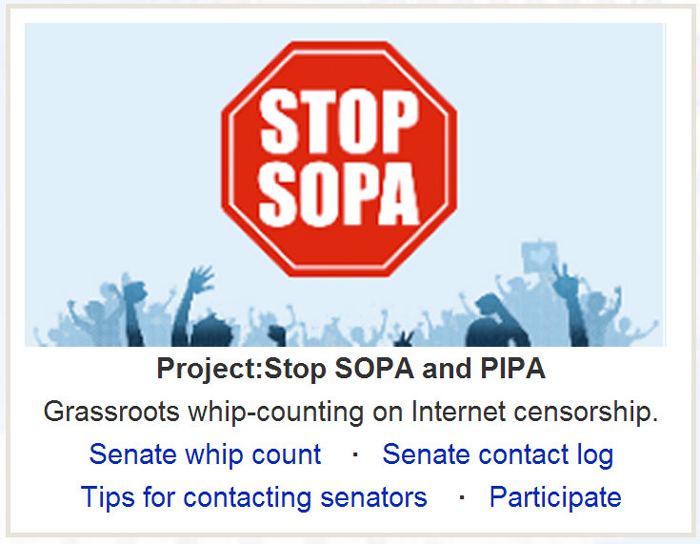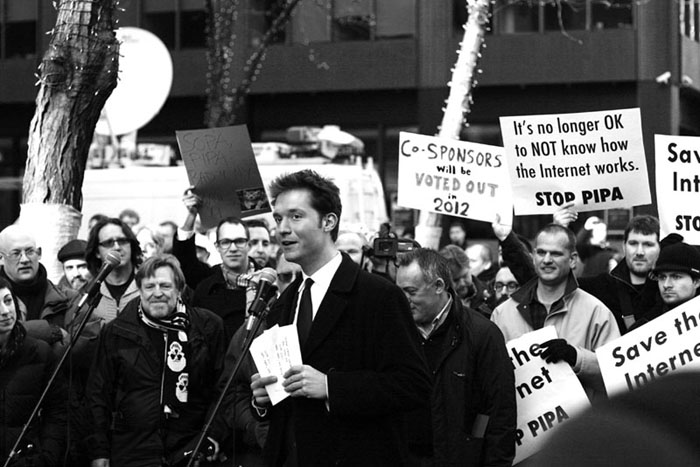Authors: and David Moon Patrick Ruffini David Segal
Tags: #Bisac Code 1: POL035000
Hacking Politics: How Geeks, Progressives, the Tea Party, Gamers, Anarchists, and Suits Teamed Up to Defeat SOPA and Save the Internet (37 page)

On the day of the SOPA/ PIPA strike, organized by a diverse coalition including our sibling non-profit Fight For the Future, OpenCongress received links to our bill page for SOPA and PIPA from major sites like Craigslist, reddit, Mozilla, and especially from search engines. Our extensive blog coverage of the net censorship threat and movement to oppose it received significant traffic and helped explain the arcane legislative process to a wide audience. Our wiki community project on PIPA urged our user community to whip their members of Congress, and especially members on key committees, in opposition to SOPA and PIPA.

Screenshot of Open Congress’ SOPA/PIPA whip count tool
Our non-profit organization, the Participatory Politics Foundation, and the OpenCongress project took a strong stance in opposition to SOPA for a number of reasons—not least of which being that we viewed it as an existential threat to OpenCongress’s mission of government transparency. A post-SOPA hypothetical world in which websites could be taken down unilaterally by the government without due process simply for linking to an allegedly offending site—as OpenCongress automatically aggregates links—would be chilling beyond belief. It was an almost unbelievably fundamentally-flawed piece of legislation that perfectly encapsulated the systemic corruption of the U.S. Congress—both of the major parties—by lobbyists and campaign contributions. Any notion of public benefit was very nearly steamrolled by a rushed push to vote on the bill with minimal expert or public input. PPF’s mission is to increase civic engagement over the Web, so we believe in strong net freedom and digital rights.
Since Nov. 26, 2011—American Censorship Day, protesting the bills—pages with SOPA info on OC received over seven hundred thousand views and PIPA over two hundred fifty thousand—totaling over a million pageviews combined. Since its introduction in October 2011, SOPA info has received over eight hundred fifty thousand pageviews; PIPA info, since May 2011, approx. three hundred fifty thousand pageviews; totaling 1.2 million pageviews on OpenCongress.
One popular OpenCongress feature is that we let users vote “aye” or “nay” on individual bills by our users. Together, SOPA/PIPA were the least-popular legislation with our user community in the past year, with a less than 1% approval rating.
The wiki community project to Whip Count on PIPA exceeded our wildest expectations. Using the Whip Count, citizens were able to pin down the position of each and every senator (though for 23 of them, that position was “undeclared”). The call log shows that users contacted those senators more who were undeclared or supported PIPA, exactly as a lobbyist would pressure those senators on her whip sheet who had noncommittal or undesired positions.
The mobilization of a vast number of citizens contacting their members of Congress is only half of the story of how the Great SOPA Showdown of 2012 shows that the Internet is changing politics. To be sure, the calls deluging congressional offices were the decisive factor in the bills’ defeat, but the use of free and open-source Web tools for online activism marked this as the first substantial case of the conversation between citizens and elected officials to happen in full public view. At OpenCongress, we built two tools that helped make this possible, with our wiki whip count and our free Contact-Congress feature.
Contact-Congress on OC bypasses the clunky webforms on individual congressional webpages, letting users send emails to their representative and senators from one place and includes information like campaign contributions they received from industries involved in the legislation. OpenCongress visitors used a number of other tools, including our money-in-politics analysis, supporter and opposition list, bill version tracking, and user-marked-up text of the bills.
Part of what makes Contact Congress particularly useful from a social perspective are its fidelity and sharing features. Users have the ability to make a letter publicly viewable, which enables them to share not only their letter but also the response from their senator or representative. Because the letter is routed through OpenCongress’ system, others can trust that the response has not been altered. It now becomes a public, verifiable source for a congressperson’s position on a bill. Because this was largely a one-day campaign, our users didn’t have time to receive many responses to post, but here’s a great example from one senator.
Grassroots campaigns to influence Congress have typically picked an upcoming vote or bill and asked citizens nationwide to call or email both their senators and/or their representative. The more sophisticated versions might only target citizens who live in the district of the members of the particular committee hearing a bill or pre-fill a letter in a webform that people can amend (or not) and send with a click. Constituents may receive a call or email back, but that usually concludes the conversation.
What made SOPA different was that much of the exchange between constituents and officials was being posted online, thus merging many private one-to-one conversations into a massive one-to-many conversation. And the back-and-forths between different citizens and the same senator thus changed from iterations of the same query-and-response into a continuing discussion between that senator and the public at large.
It might have ended there, but citizens started using social media to track the conversations and coordinate responses. Some top-voted threads on reddit posted the defections from the bill and senators took to their Facebook pages to announce their opposition to the bill, which were promptly commented on, liked, and shared on the personal pages of constituents at volumes many times the average post. What transformed these public conversations from an effective way for people in any state to influence their senators into a way for the people to influence the senate as a body was the adoption of a common lobbyists’ tool: the whip sheet. Whip sheets are simple lists of every member of the House or Senate with their current position on a bill. Well-funded lobby shops will chop up the list and send delegates to buttonhole each member and then target and re-target
the members opposite their position until the get the necessary number of votes to win. They are even used by congressional leaders to make sure they have the votes to forward their party’s agenda.
SOPA Opera (
http://projects.propublica.org/sopa/
, now at ProPublica) was the first effort to put a people’s whip sheet online. It used members’ sponsorship of SOPA/PIPA or votes on previous, similar bills to make a rough prediction of where the current vote stood, which staff then augmented as more of them made public positions on the bills. Then OpenCongress posted the Protect IP Act Senate Whip Count, a user-editable form with every senator’s phone numbers, email contact forms, last known position on PIPA, and a call log for users to record the date, time, and content of their communications with Congress.

A screenshot of ProPublica’s SOPA Opera whip count.
SOPA and PIPA showed that citizens can overwhelm Washington with public sentiment, at least when prompted to by the highest-traffic websites in the world. Short of such likely rare events, however, it is the adaptation and adoption of traditional lobbyist tools like vote counting—through whip sheets—and coordination of communications—through social media and tools like Contact Congress—that will help level the playing field between the body politic and the lobby.
To quote one of Prof. Yochai Benkler’s presentations on his ongoing research on the SOPA strike actions: “What you see is a complex relationship between NGOs and commercial organizations, between V.C.’s and activists, between traditional media and online media, between political media left and right and tech media, all weaving together a model of actually looking, learning, mobilizing for action, and blocking [SOPA]. This, ideally, is the shape of the networked public sphere.”
Prof. Benkler’s vision is core to PPF’s founding mission—that the open Web can and will generate networks for peer-to-peer watchdogging of our elected officials, mitigating systemic corruption in government, and improving political outcomes for the public benefit. For example, the free OCv3 online organizing features used in the stop-SOPA movement can help groups engage with any of the bills and issues they’re tracking at the federal level. Our ongoing work to turn OpenCongress into a two-way platform for continual, reciprocal communication with elected officials will result in a more deliberative and participatory democracy.
ALEXIS OHANIAN

Alexis Ohanian speaking at the NY Tech Emergency Meetup January 18, 2012
Alexis Ohanian is a startup founder and investor in Brooklyn, NY. After graduating from UVA in 2005, Alexis co-founded reddit, now a top 100 website. Now a reddit board member, Alexis focuses on social enterprise Breadpig, publishing authors like xkcd and SMBC, and donating profits to worthy causes. Alexis helped launch hipmunk and ran marketing/pr/community before becoming an advisor and joining the fight against SOPA & PIPA
.
As an entrepreneur, I never expected to find “political activist” in my bio, but here we are.
At the time I started “hacking politics,” I’d been running marketing and PR for hipmunk, a travel search startup I’d helped launch just a year earlier with my reddit co-founder Steve Huffman and our friend Adam Goldstein. Other than work, my days were spent outlining my book,
Without Your Permission
, trying to be a good angel investor, and agonizing over my favorite team, the Washington Redskins.
My foray into the political arena began with an email on November 6, 2011. Christina Xu, who works with me at Breadpig—a social enterprise I’d started—sent along a note from a friend who alerted her to a pair of bills that looked destined to pass the House and Senate before the New Year.
Written with over $94 million in lobbying from the entertainment industry, the first versions of SOPA and PIPA read as though a technologist had never even been consulted. If either of these bills had been law back in 2005 when Steve and I founded reddit together, the site wouldn’t exist today.
I got in touch with Christina’s friend, who’d started a non-profit called Fight From The Future, and I offered to help. I’d do whatever they needed to help beat the bad legislation.
Fortuitously, just a few days later, a group of entrepreneurs and technologists led by the Consumer Electronics Association were meeting with senators, representatives, and their staffs in Washington D.C. They invited me along. I live in Brooklyn, but it just so happened I was already scheduled to be in D.C. for a speaking event with Mashable. Life is funny like that. My dad even had a tie I could borrow.
We went from meeting to meeting telling our stories; each of us was given only a few minutes to get our points across. I represented the token “startup entrepreneur” who’d been fortunate enough to live the American Dream with his college roommate. What got Washington’s attention was the pitch I’d refined the night before with the help of the reddit community. I asked redditors (in the subreddit r/technology) for feedback on my talking points, and they helped strengthen and hone my argument.

